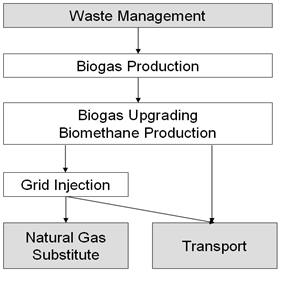
In many European regions waste management is still a major problem and only few biogas plants use organic waste for biogas production. Insufficient waste management practices are especially dominant in urban areas. Many countries still dump large portions of municipal solid waste (MSW) on landfills, instead of using it as a source of energy and nutrients. The simultaneous energetic use of organic waste, such as MSW and catering/food waste (FW), and the creation of a closed nutrient cycle is one of the main advantages of anaerobic digestion (AD) with biogas plants as they turn waste materials into “desirable” feedstock.
Furthermore, European countries have to comply with the Landfill Directive 1999/31/EC and Waste Directive 2006/12/EC to reduce land filling of the biodegradable part of MSW to 35% within the next five to ten years. They also have to comply with the Renewable Energy Directive (RED) 2009/28/EC.
Biogas production from waste has the potential to contribute to the European targets of the above mentioned directives. Adjacent upgrading to natural gas quality (biomethane) and grid injection into the natural gas distribution network is an opportunity to efficiently use renewable energy in urban areas. This approach, Waste-to-Biomethane (WtB), is promoted by UrbanBiogas.









